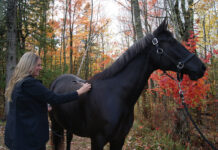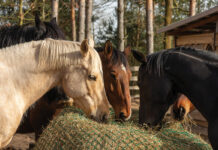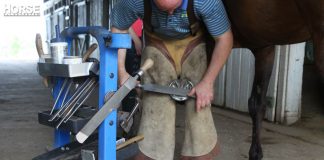
Your horse’s regular vaccinations are one of the cornerstones of his health care regimen. Regardless of whether your horse is a show campaigner or never leaves the farm, there are certain vaccines that every horse should receive. Perhaps you’ve considered saving the cost of a vet call by administering your horse’s shots by yourself. However, the benefits of having your vet out for annual vaccinations far outweigh the cost.
The Vet Visit
- Your veterinarian is trained in the fields of vaccinology, immunology and infectious disease control and is your best source of information and knowledge [on these topics].
- Your veterinarian can perform a pre-vaccination examination on the horse to make sure he is healthy and free of clinical disease. Vaccination administered to a sick or unhealthy horse may render the vaccine ineffective and, in some cases, may worsen the horses’ medical condition.
- Your veterinarian is qualified to do a disease risk assessment for each horse on the farm to help determine vaccination needs of the individual animals. This is especially important with the risk-based diseases such as equine influenza, equine herpesvirus, strangles, Potomac horse fever, etc.
- Your veterinarian can provide guidance regarding special vaccine considerations for certain horses or groups of horses. Examples:
- An older horse with Cushing’s disease.
- A horse on medications such as steroids, and the effect that may have upon vaccination.
- Foals – When vaccinating foals the timing of vaccine administration is critical. Your veterinarian is also knowledgeable about factors such as maternal antibody interference that may have an effect on vaccination. It is also important to make sure foals receive the recommended number of vaccination boosters as part of the primary series of immunizations.
- Your veterinarian will know which diseases are of concern in the area.
- Your veterinarian will have information that may be available regarding any new vaccines and infectious disease control guidelines.
- Your veterinarian is better qualified to make the right vaccine choices for your horses. For example, if an equine influenza outbreak has recently been diagnosed in the area or you will be traveling to an area where there has been an outbreak, your veterinarian may recommend the intranasal influenza vaccine Flu Avert.
- Your veterinarian can provide information and make recommendations regarding other infectious disease control guidelines. Vaccination programs will not succeed without appropriate management practices. Your veterinarian is your best source of information regarding biosecurity and infectious disease control guidelines besides vaccination.
- Your veterinarian is trained and prepared to treat a vaccine-associated adverse reaction should one occur. If your horse experiences a rare but serious anaphylactic reaction to vaccination, having your veterinarian on hand to treat the reaction is critical.
Vaccination Strategies
Safe administration of vaccines is one of the primary reasons to have your vet out to see your horse at least once every year. Your vet will be able to minimize the risk of adverse reactions and handle any problems that might arise.
“There are multiple complications that may occur if a vaccine is improperly administered,” says Barnett. “One of the most common complications is the development of post-vaccination injection site reactions as a result of the vaccine being administered in an improper location. An example would be placement of a vaccine either too high or too low in the neck. Administration too low often results in the vaccine being given very close to the horse’s cervical spine, resulting in a very sore, painful neck. Vaccines administered too high in the neck may result in local injection site reactions because the vaccine is given either directly into, or close to, the nuchal ligament (the large ligament on top of the neck which runs from the withers to the poll). Administration of a vaccine around larger vessels and nerves may also increase the risk of local injection site reactions.”
Even with correct needle placement, if the horse moves his neck or your hand is unsteady during the injection, that can also lead to a reaction. Additionally, vaccines that are intended to be given deep in the muscle can cause a reaction if they are not administered deep enough.
“Improper handling of vaccines may also have negative consequences,” continues Barnett. “If a vaccine is allowed to get too hot or too cold, there is the potential for inactivation of the antigens1, rendering the vaccine ineffective, and in certain situations this may increase the risk of an adverse reaction.
“Local injection site reactions can occur even when proper placement and technique are used,” explains Barnett. “But proper placement and proper technique will help diminish the chances of a local injection-site reaction.”
What is a Reaction?
In the rare instances when a horse does have a bad reaction to a vaccine, the symptoms are typically mild. It helps to know what kind of reaction you should watch out for when having your horse vaccinated.
“In horses, as in humans, adverse reactions do occur and are an inherent risk of vaccination,” says Barnett. “Fortunately, the incidence of vaccine-associated reactions is very low and when they do occur, the majority are transient, mild, and generally self-limiting. However, on occasion more severe vaccine-associated adverse events, such as an allergic anaphylactic reaction, may occur.
“Most vaccine reactions involve local injection site reactions [such as] heat, pain, swelling at the injection site,” continues Barnett. “The goal of vaccine administration is to stimulate an immune response. When the immune system is stimulated, there is a rather complex cascade of events that may result in fever and lethargy.”
Typically these mild reactions will pass on their own with no serious or long-term effects. In rare cases, certain horses may have an allergic-type reaction to a vaccine, and that may require veterinary intervention.
“Signs of a vaccine-associated allergic reaction may include the development of hives (urticaria), increased or labored respiration, sweating, elevated heart rate, swelling of the legs and underside, facial swelling, and in some cases colic,” explains Barnett. “Anaphylaxis is a very serious allergic reaction in which the horse exhibits one or a combination of these symptoms in an exacerbated manner. This is a serious, life-threatening condition requiring immediate medical intervention. Although it is extremely rare, severe anaphylaxis may result in collapse and death.
“It is worth noting that these allergic vaccine reactions are based upon the unique immunological makeup of the individual animal,” adds Barnett. “It is very difficult to identify individual horses predisposed to allergic reactions. Because vaccine reactions of an allergic nature are due to the immunologic makeup of the individual horse and their inability to tolerate the vaccine, the reaction is generally not due to a faulty or defective product. However, it is recommended that all vaccine reactions be reported to the manufacturer. Manufacturers of vaccines encourage veterinarians and horse owners to report any real or perceived vaccine associated adverse event.”
Dealing with the Past
Fortunately, most horses tolerate vaccinations very well and will never have an adverse reaction. But what if you know that your horse has had a bad reaction in the past?
“Caution should be exercised when vaccinating any horse that has previously been reported to have had reactions, especially if the clinical signs were suggestive of an allergic type of vaccine reaction,” says Barnett. “Allergic vaccine reactions may get worse upon subsequent exposure to the vaccine or vaccines. It should be recognized that the horse may be reacting to one or a combination of components in the vaccine.”
Barnett stresses taking the following into consideration when planning vaccinations for a horse with a history of adverse reactions:
- If possible, avoid using vaccines or antigens that were either suspect or known to have caused the reaction.
- Do a critical disease risk assessment and risk versus benefit assessment for that horse. Consider eliminating antigens where the disease is not a significant risk.
- For other needed antigens (core vaccines or vaccines of moderate to high risk), consider using monovalent or bivalent vaccines (vaccines containing only one or two antigens).
- Consider switching to a different adjuvant 2.
- Administer only one vaccine per day.
- When available, consider using non-adjuvanted vaccines and/or intranasal vaccines (i.e. intranasal Flu Avert).
- Consider pre-medicating (i.e. with Banamine and/or antihistamines; if at all possible avoid steroids).
- Consider doing allergy skin testing using different vaccines and/or antigens and adjuvants.
- Be prepared to treat for an allergic reaction should one occur. Remember, clinical signs may worsen with subsequent allergic vaccine reactions.
Managing Risk
Because of the nature of vaccines, the risk of a reaction can never be completely ruled out. But for the vast majority of horse owners, vaccinations are a safe way to ensure the health of your herd.
“I would like to reiterate that vaccine reactions are a known and inherent risk of vaccination,” says Barnett. “Because foreign materials are being injected into a biological system, the risk of adverse reactions associated with vaccine administration cannot be eliminated and every horse owner and veterinarian needs to recognize this inherent risk. Recognition of these inherent risks should not undermine the importance of infectious disease control programs and their importance in maximizing the health, productivity, and performance of horses. Vaccination forms a very important part of the overall infectious disease control program in most equine operations. Again, the overall incidence of vaccine reactions is very low, and unless you have a horse that is predisposed to vaccine reactions, the incidence does not generally warrant avoidance of preventative vaccination.”
1. Antigen – anything the body recognizes as ‘foreign’ and subsequently tries to mount an immune response against. In the case of vaccines, the antigen is the viral or bacterial component of the vaccine (i.e. influenza virus, rabies virus, tetanus bacteria, etc.)
2. Adjuvants are substances added to killed or inactivated vaccines to help enhance the immune response.
Leslie Potter is Sr. Associate Web Editor of horseillustrated.com. Follow her on Twitter: @LeslieInLex.






My horses have never had reactions to their vaccines but this year both of them were sick for a week. It makes me wonder why?